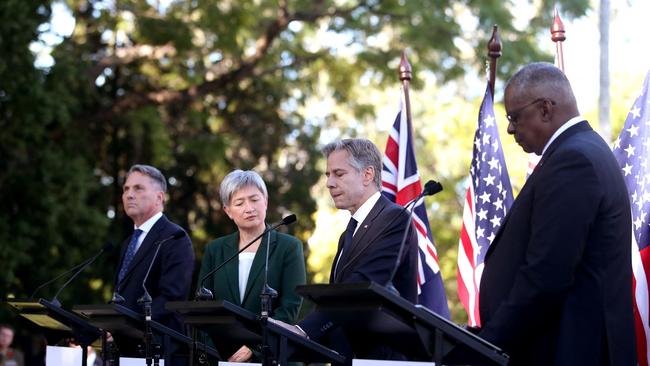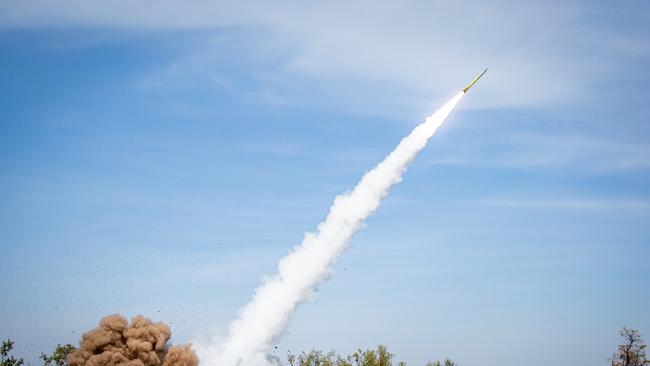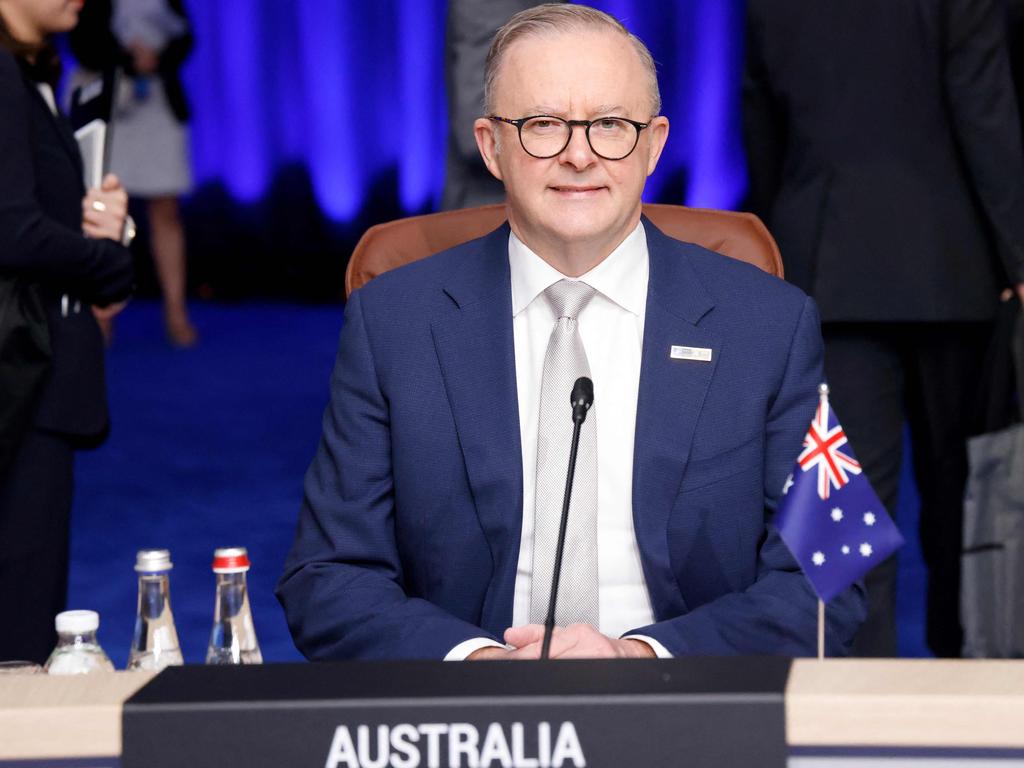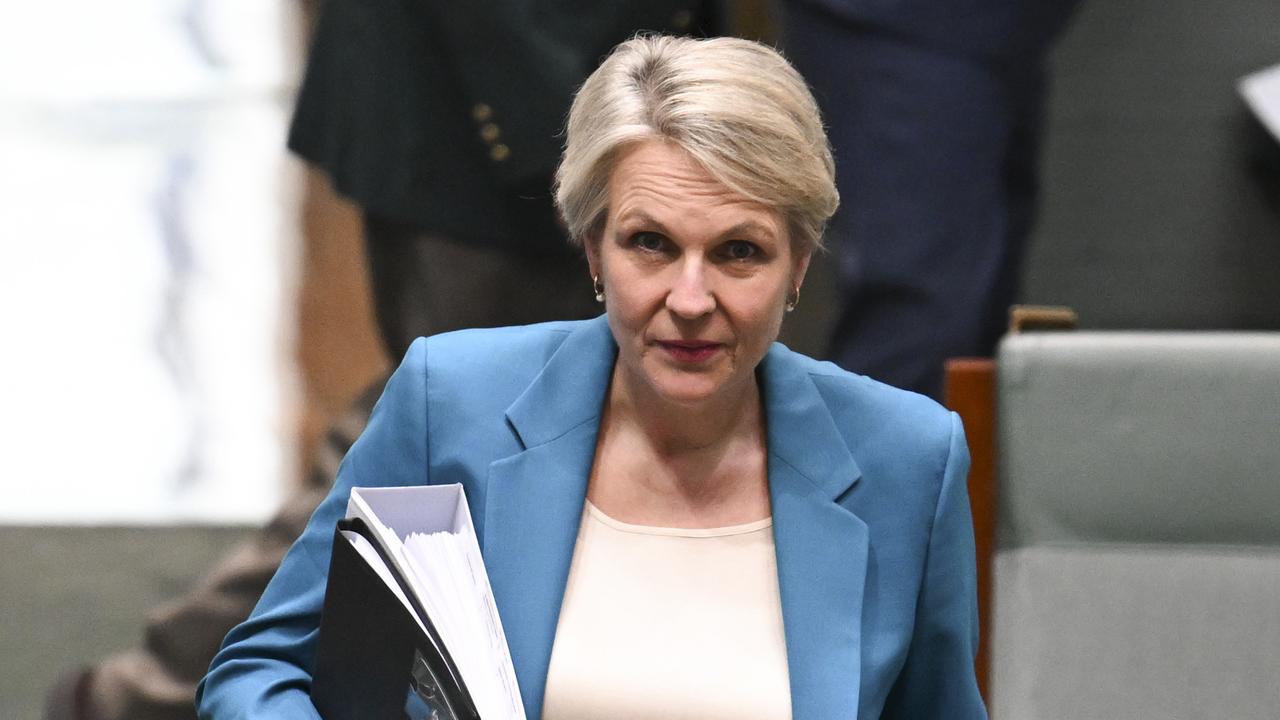Secret space deal agreed to in AUSMIN talks as US green lights missile production in Australia
Defence Secretary Lloyd Austin said America is stepping up its ‘force posture initiatives’ in Australia and forging a new partnership in space.

The US and Australia will embark on a secret new space partnership amid Chinese technological leaps that threaten US supremacy in the key military domain.
The initiative, which is likely to include the development of offensive space-based capabilities, was agreed at AUSMIN talks in Brisbane, where the US also vowed to help Australia to produce advanced new missile systems within three years.
US Defence Secretary Lloyd Austin, Secretary of State Antony Blinken met with their Australian counterparts Richard Marles and Penny Wong on Saturday, declaring “enhanced space cooperation” a new priority for the nations’ “unbreakable alliance”.
Mr Marles refused to provide details of the cooperation when asked directly whether it would involve the development of space-based weapons.
“Space domain awareness will form part of the co-operation that we engage in between our two countries in terms of force posture arrangements in this area,” the Defence Minister said.
“That’ll probably be the extent of what any of us will ever say about what else we do in respect of co-operation involving space.”
The meeting occurred against the solemn backdrop of the feared deaths of four Australian Army soldiers in a helicopter accident off Hamilton Island, with all of the participants paying tribute to lost personnel.
Mr Austin said the US was stepping-up its force posture initiatives in Australia, with the new areas of cooperation requiring the nations to “sharpen our technological edge and strengthen our defence industrial bases”.
He said the Biden administration was “racing” to provide Australia will access to priority munitions, giving the green light for Australia to build US-designed Guided Multiple Launch Rocket Systems, known as GMLRS.
The joint AUSMIN statement said: “This is key to expanding the combined industrial power of the alliance and to building Australia’s industrial infrastructure and skilled workforce.”
The US will invest in upgrades to Australia’s northern bases and step-up the rotations of its military forces through Australia, with annual deployments of US Army watercraft units to operate with Australian counterparts.
The counterparts also announced plans for “more regular and longer visits” of US nuclear-powered submarines to Australia ahead of the deployment of US and British boats to Western Australia from 2027.

In addition to upgrades already underway at RAAF Bases Darwin and Tindal, preliminary work will be undertaken to upgrade so-called “bare bases” at Scherger and Curtin.
The Australian Defence Force’s Space Commander, Air Vice-Marshal Cath Roberts, has previously revealed Australia is working on a plan to acquire “soft-kill” capabilities to neutralise enemy satellites without creating destructive debris clouds.
China and Russia both have the ability to destroy, disable or move satellites in orbit.
The Lockheed Martin-manufactured GMLRS, which can be fired by HIMARS launchers being acquired by Australia, have a range of more than 70km and are highly accurate.
The AUSMIN talks ranged across the breadth of the nations’ “unbreakable” alliance and included a call by Senator Wong for the US to bring “to a conclusion” its case against Australian WikiLeaks founder Julian Assange.
But Secretary Blinken told reporters that the US would not drop its pursuit of Mr Assange, who is fighting US attempts to extradite him from the UK, saying he was wanted for jeopardising the country’s security and putting intelligence operatives at risk.
“Mr Assange was charged with very serious criminal conduct in the United States, in connection with his alleged role in one of the largest compromises of classified information in the history of our country,” Mr Blinken said.
“The actions that he is alleged to have committed risked very serious harm to our national security, to the benefit of our adversaries, and put named human sources at grave risk, grave risk of physical harm grave risk of detention.”
The meeting came amid a standoff in the US Congress over the nation’s nuclear submarine partnership, with Republicans demanding a more than 100 per cent increase in US submarine production before they will allow Virginia-class boaters to be transferred to Australia.
Mr Marles said the US visitors had “absolutely assured” Australia there was no threat to America’s AUKUS commitment to provide Australia with three to five nuclear submarines.
The talks focussed heavily on the strategic threat posed by China’s growing influence across the region and its surging military modernisation.
Mr Austin said the US would support any Australian effort to help Solomon Islands establish a military force amid a request by the country’s Prime Minister Manasseh Sogavare, whose relationship with Beijing is a serious concerns for the allies.
“We share a common vision of a free and open Indo-Pacific,” he said. “We‘re committed to investing further in our alliance to uphold this vision.”
The counterparts affirmed their “strong opposition to destabilising actions in the South China Sea”, including China’s militarisation of disputed islands and reefs, and the unsafe behaviour of its ships and aircraft.
They also voiced concerns over China’s activities in the East China Sea, where it is developing natural resources in disputed areas, and warned against any “unilateral changes to the status quo” in relation to Taiwan.







